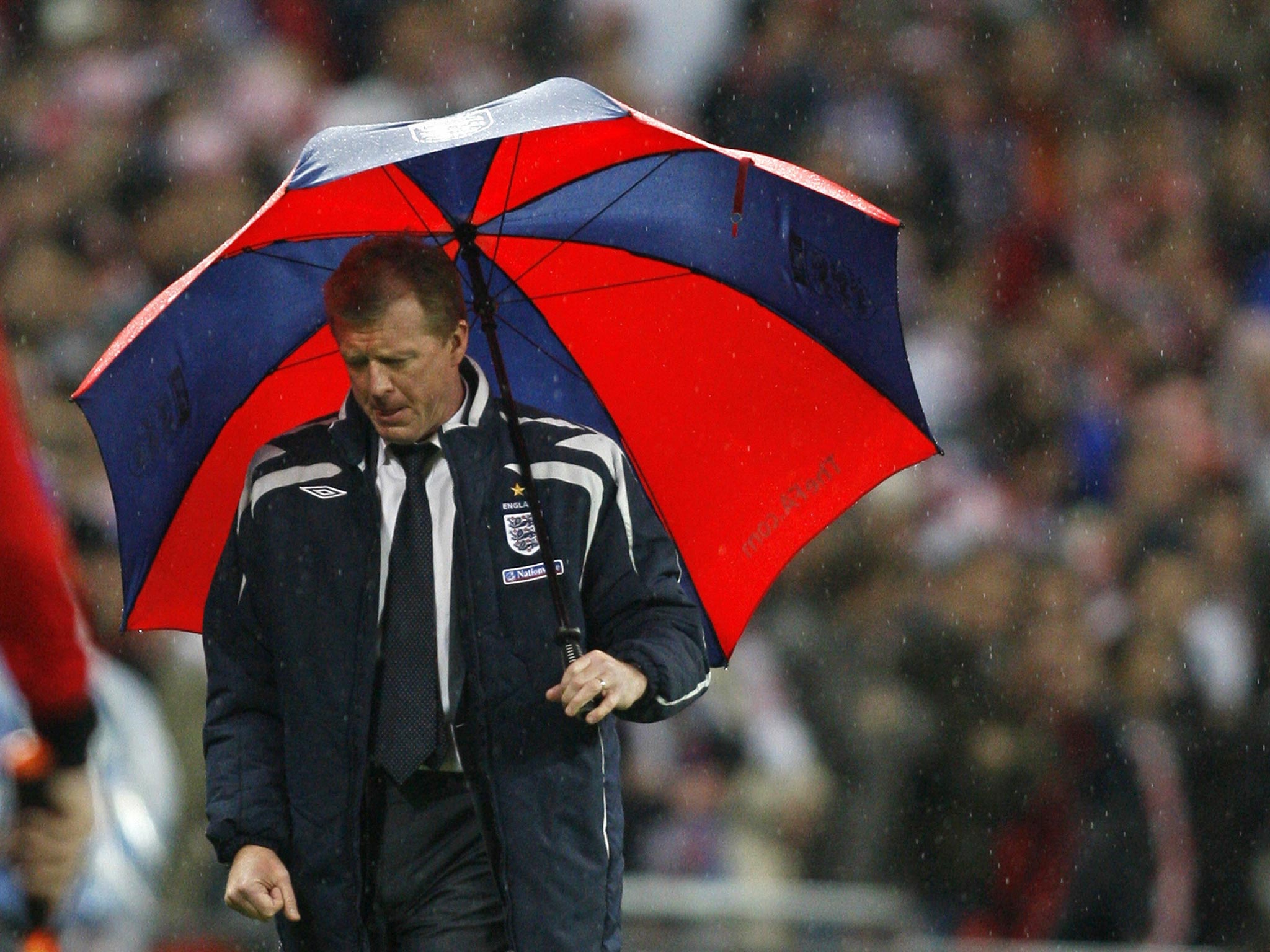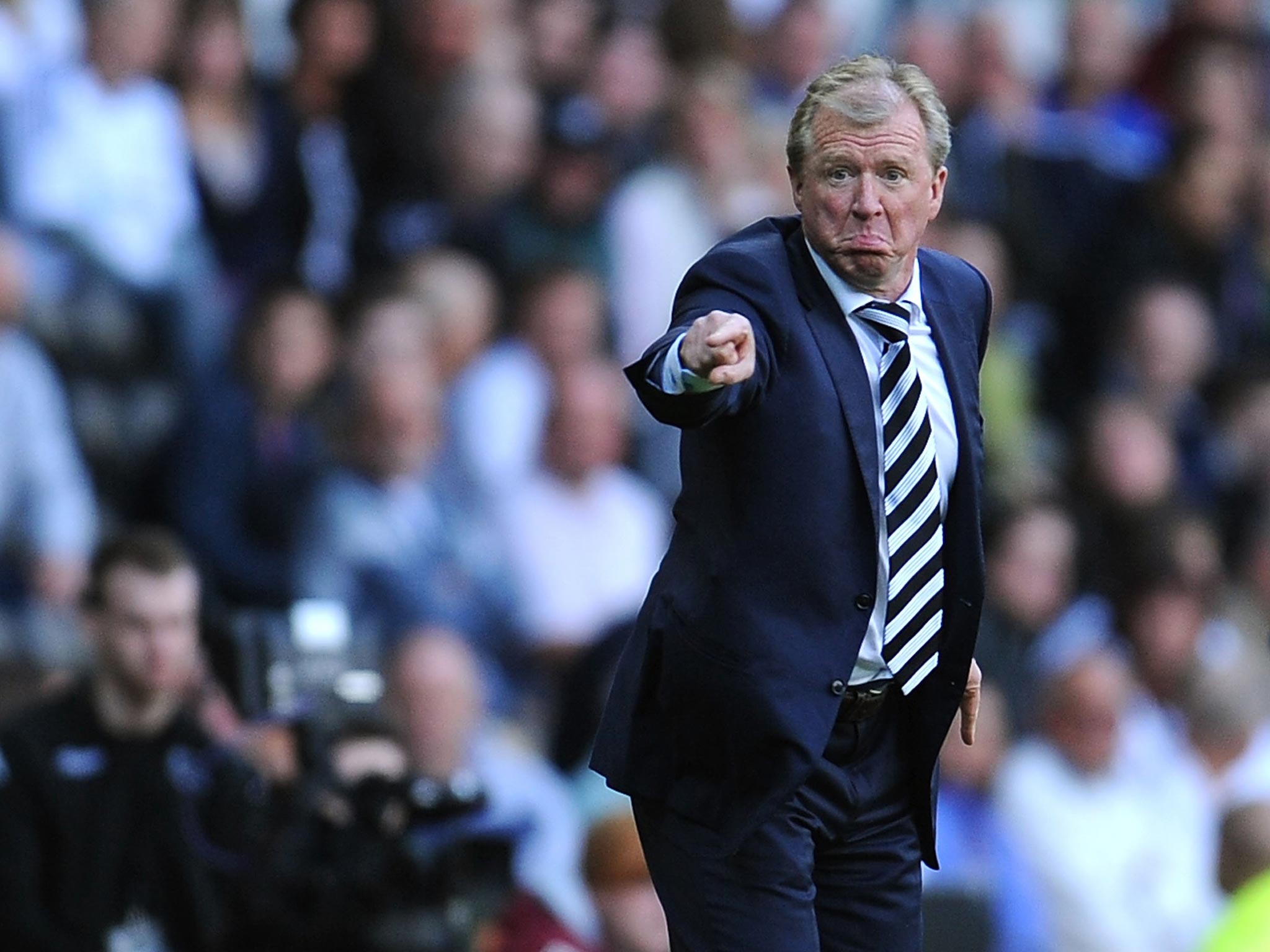Steve McClaren back at Wembley: 'Wally with the brolly' returns, but this time it's all about the lolly
There will be no umbrellas in sight as the resurgent Derby manager seeks a £120m promotion payout

Steve McClaren was approached in the car park at the iPro Stadium this week by two supporters who had come all the way from Australia to cheer on Derby County in today’s Championship play-off final. “It must have been a long flight,” quipped McClaren as he described how one of the pair predicted that his team would beat Queen’s Park Rangers 8-0.
Those Aussies are not the only ones to have made a long journey to Wembley; in a sense, the same could be said of McClaren himself. It is six and a half years since he last led a team out at the national stadium. It was a rainy November night in 2007 when, as England manager, he had the door to Euro 2008 slammed in his face by Croatia.
The story of how he rebuilt his reputation in the Netherlands, winning the Dutch title in the first of two spells with Twente, and tasted Bundesliga football with Wolfsburg has been well told. Finally opportunity knocks once more for the 53-year-old in his home land and the prize could hardly be greater.
Promotion would give McClaren his first stab at Premier League management since leaving Middlesbrough for the England job in 2006. For Derby, whose turnover for the last financial year was £15.4m, it would bring a £120m windfall. “If you look at the consequences of the game and the enormity of the game and what it could mean, then you’d be a quivering wreck,” McClaren said.
The consequences last time, after that 3-2 defeat by Croatia, were the sack for the man immediately dubbed “the wally with the brolly”. He admits that failure still rankles. “It was just the feeling of letting the nation down, that was the biggest thing. At the time I thought I was ready and the job finds out that you are not ready. I didn’t have the experience [and] together with a little bit of bad luck it didn’t work out. But I have gone away and had great experiences and come back and am doing what I enjoy doing at a great club that I know well.”
McClaren has come full circle, returning to the club where he spent three years as a player in the 1980s, and four as Jim Smith’s assistant in the 1990s. With Smith he helped steer Derby to promotion to the Premier League in 1996 and steadily built a reputation as a progressive young coach, introducing, for instance, Prozone analysis – now a staple at Premier League clubs.
“They were great days with Jim. I knew then what Derby County was all about. Coming back we just want to create those times again.”
If Smith, who still calls him before every game, gave him his chance as a coach, he acknowledges he also owes a debt of gratitude to Harry Redknapp, his Wembley rival this afternoon. This time last year McClaren was at home pondering his future, having ended his second spell at Twente a few months earlier. His only opportunity in this country since the England job had been a brief 112-day spell at Nottingham Forest, yet Redknapp offered him a coaching position at QPR.

“It came about through Jamie [Redknapp], who I met at a dinner. He mooted the idea and said he would mention it to his dad. I was doing nothing and it was [a question of] go and coach a good football team or go to Tesco every day and do the shopping. A tough choice. I think I took the right one.”
The lesson of his three months at Loftus Road is that Redknapp warrants more credit than he receives for Rangers’ presence in the play-off final. McClaren was shocked by the state he found the club in. “There were many players who didn’t want to be there, who weren’t on the training field,” he explained. “I said to Harry after two weeks, ‘You’ve got a tough job turning it around’. QPR could have gone very quickly down the leagues, as other clubs have done, if it hadn’t have been for Harry.
“I think only Harry Redknapp could have done that job, I really do. Harry did what Harry does best. There were a lot of players who didn’t want to be there; he had to be ruthless and they had to go. What he had then to piece together was a squad that could challenge to get back into the Premier League.”
At Derby, by contrast, McClaren inherited a “young, exuberant” squad from his predecessor Nigel Clough, one containing home-grown talents such as Jeff Hendrick and Will Hughes to which he added impressive loan recruits like defender Andre Wisdom and midfielder George Thorne.
The contrast between the two teams is striking: while QPR’s squad is packed with ex-Premier League footballers, the combined top-flight experience of Derby’s starting XI for the play-off semi-final home win against Brighton was 28 matches. At the club’s media day on Tuesday, central defender Jake Buxton recalled his days spray-painting cars and playing part-time in the Conference for Burton Albion. “That is the kind of club that I want – humble, full of humility and keeping our feet on the ground, going with the flow and trying to excite this crowd with our football,” said McClaren.
The buzz is certainly back. Under McClaren and his coaching team of Paul Simpson and Eric Steele – Derby old boys themselves – a close-knit team rose from 14th in the Championship to third. The question is whether they can rise to the Wembley occasion or if QPR’s greater experience will tell.
“There is a lot of pressure on Queen’s Park Rangers and they have got to handle that,” McClaren said. “It is a necessity that they go up, really. I know that from being there.”
Of his own players, he takes heart from their display in beating Brighton 4-1 in the second leg of their play-off semi-final – their eighth win in 10. “They gave a near-perfect performance in terms of dealing with the pressure and the enormity of the game.”
Now for Wembley and McClaren’s own return to the scene of his unhappiest hour. “I was there for the FA Cup final – what a fantastic atmosphere. I’d forgotten what it was like. I said to the boys, ‘You will love the atmosphere’. That was 25,000 [fans] each and we have 40,000 each.”
All he needs now is a happy ending this time.
Join our commenting forum
Join thought-provoking conversations, follow other Independent readers and see their replies
Comments
Bookmark popover
Removed from bookmarks